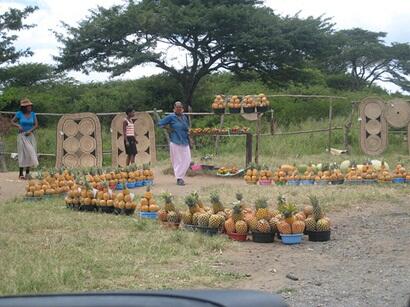“Scaling up” from niche markets – is it possible?
I just read a summary of a PhD thesis by Linda Kleemann studying development economics at Kiel Institute for the World Economy. Linda looked at panel data on farmers adopting organic pineapple production and certification in Ghana. After three years of studying farm adoption patterns, she concluded the following:
Non-certified pineapples in South Africa
Image: Zusjeg, Flickr
“Organic production seems more profitable than conventional production due to the retail level price premium…that overcompensates lower yields on organic farms.”
However, “…certification with internationally approved labels requires a substantial investment on the side of the farmers”.
“The data also shows that relatively poorer, less educated households are more likely to adopt organic production… implies that organic certification is pro-poor”.
“Organic certification serves as a catalyst for the increased use of agroecological farming methods and…that there is not necessarily a trade-off between economic efficiency and environmental friendly farming practices…potential exists for scaling up at given price ratios”.
“However, even though cost-effective, their overall use (of organics) is still very low. Therefore, their increased usage should be supported more actively, especially by overcoming transport cost barriers and by exploiting economies of scale.”
So in summary, poor farmers can be profitable by getting certified as organic particularly because the higher prices compensate for lower yields. There is scope for greater economies of scale to make developing countries more competitive. However, the scope for the sector to “scale up” organic production is limited by “price ratios”, i.e. the organic market is small.
“Scaling up” in the area of voluntary standards is advocated by some policy groups, for example ISEAL Alliance. The notion seems counter-intuitive to me. Voluntary environmental and social standards define production and processing methods that are an improvement on the mainstream. However, applying these standards usually means incurring higher production costs. Mechanical weeding methods that have costly labour charges, for example, are used instead of the relatively cheaper agrochemicals. Other examples include discarding fish that are not a minimum size and thus reducing the overall catch.
How could these standards be “scaled up” without having consumers prepared to pay for higher cost practices? These could only be achieved in standards that are not very different from the mainstream in the first place.
Notes:
For more on ITC’s work on organic agriculture in the Trade and Environment Programme.
See also a recent publication on private standards by my colleagues Gabi Alvarez and Oliver von Hagen.
Back to the main page of ITC environment blog.
You can also follow Alex on Twitter.




